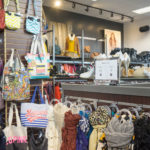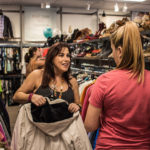There’s a long-held misconception that “used” needs to have a negative connotation. We think of previously used cars, electronics and even clothes as somehow inferior to “new” versions. But, in fact, it’s a stigma that’s due to break—and it is breaking. Thrifty consumers from all age groups are becoming a voice of reason for conscious consumerism. Gently-used items aren’t just in-demand these days: they’re in vogue.
Clothing is at the top of the list for many conscious consumers. They’re not lowering their standards for fashion or brand identity. Instead, they’re turning to secondhand markets to get the apparel they want at a price they’re willing to pay. This is why Uptown Cheapskate has seen such booming success in recent years.
What is conscious consumerism?
Conscious consumerism is the philosophy of buying products responsibly. Some of the most common ways shoppers practice conscious consumerism include:
- Buying locally-made and -sourced goods instead of imports
- Buying fair-trade goods from wage-conscious companies
- Buying goods from companies with ethical and sustainable practices
- Reusing and repairing products to extend their functional life
And, of course, buying secondhand products fits into this list—especially clothing. Whether they’re looking for a cute skirt or new handbag, conscious consumers seek to give a second life to apparel that’s still fashionable. What might not have been a good fit or the right style for someone else is the perfect addition to the conscious consumer’s wardrobe.
The growth of secondhand shopping
The secondhand clothing industry is going through a period of disruption right now—one that will see brands like Uptown Cheapskate float to the top of the clothing retail market.
Only a few years ago, the term “secondhand clothing store” might have conjured images of thrift stores racked with disorganization and poor quality. Today, with the rise of luxury brand resellers and high-end secondhand clothing stores, the perception has shifted. Consider companies like The RealReal and Rebag, which focus exclusively on reselling high-end designer clothing, for example.
Demand for quality goods at lower prices, coupled with conscious consumerism and even social media trends, has put the secondhand clothing market in a prime position to boom in the coming years. How big can it get? A new report suggests the secondhand clothing market could become twice the size of fast fashion by 2030.
Established franchises will win in the future
As consumers begin to embrace the concept of upscale resale, their attention will turn to finding resellers they can trust. They’re looking for establishments carrying the brands and fashions they want, at prices they can afford, in an environment that goes against the traditional stereotype of a secondhand store. They’re finding all this and more in Uptown Cheapskate boutiques.
Now is the time to build a loyal customer base, during the infancy of the upscale resale movement. Conscious consumerism is only going to continue to boom. Learn how becoming an Uptown Cheapskate franchisee can put you in a position to meet the growing demand for quality, fashionable apparel at discounted, affordable prices. Become a franchise owner today!





